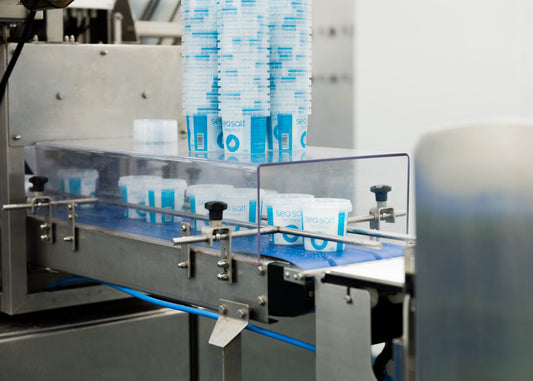We've enlisted the help of Naomi Langford-Archer, registered Nutritional Therapist and founder of GUT Nutrition, to work with us in our quest to ensure that Cornish Sea Salt is used as part of a healthy, balanced diet. We caught up with her to talk about GUT Nutrition, gut health, her thoughts on diet myths, and all of the ways salt can be used to help the body.
Naomi will be our go-to expert when it comes to checking out nutritional advice so she'll be popping up in our content through the year.

How long have you been working in nutrition?
For 2 years, after training for 3 years.
What drew you to a career in nutrition?
I struggled for a long period of time with anxiety and bouts of depression, I saw countless therapists and tried different medications but it wasn’t until I went to see a nutritional therapist that I finally started to feel better. There were imbalances in my body that I didn’t even know about. I was so keen to learn more so that I embarked on a 3 year course and have not looked back since!
Our salt is high in minerals including calcium, potassium and magnesium. How are these minerals used by the body for healthy functioning?
Salt is incredibly important for us due to the essential minerals it contains.
Calcium – it is more than just for bone health. It is required to transmit messages between cells so that the body can work effectively, transmitting information back and forth all the time. It is also important in blood clotting, muscle contraction and hormone secretion.
Potassium – the third most abundant mineral in the body. It is absolutely vital for optimal heart health, it’s functions include regulating the heartbeat and nerve impulses, preventing muscle cramps (common post exercise due to minerals lost in sweat) and supporting energy levels.
Magnesium – my favourite of all the minerals, it is just as medicinal for calming the nervous system as alcohol! It is excellent for stimulating the parasympathetic nervous system (rest and repair) and relaxing muscles including the bowel, aiding with constipation. It is required for over 300 reactions in the body and is known as ‘nature’s tranquilliser’. Magnesium deficiency can cause migraines, high blood pressure, struggle sleeping, osteoporosis, anxiety and fatigue.
Have you got any ideas for alternative uses for salt from a health / holistic perspective?
Absolutely, try swilling your mouth with salty water (add a bit of coconut oil in too) if you suffer with gum disease or bleeding gums, it is also great for mouth ulcers and sore throats - try gargling with salty water. Salt inhalation is excellent for asthma or COPD sufferers - there are actually salt caves you can visit for this reason. Bathing in a salty bath is good for muscle aches and pains and soothing any skin condition such as eczema or psoriasis for example.
In a few sentences, how important is it for us to look after our gut health?
Where to start. Let's just say that if your gut is out of whack the rest of your body will eventually suffer. It is where I start with all my clients and what sorted my anxiety and depression out. 80% of your immune system is located in your gut and 90% of your body’s serotonin (happy hormone) is made in the gut, therefore a healthy digestive tract is vital to achieving optimal health and happiness which is possible for everyone.
We are really keen to encourage people to pay attention to their gut health. What are the best foods that you would recommend people have, and how regularly do you think they should be eaten?
Foods and drinks specific to supporting a healthy gut microbiome include sauerkraut, kimchi, kefir and kombucha to name a few. These all contain healthy bacteria so important for optimal gut health. Sauerkraut and kimchi are made from fermenting vegetables using salt to draw out fluids and preserve the ferment but it is important to get a good quality salt – you do NOT want normal table salt.
There has been a lot of misinformation over the years about the role of salt in diet, and that it’s always bad for us. How do you recommend including sea salt as a key part of a healthy diet?
Firstly, and just to reiterate, avoid normal table salt at all costs as it has been stripped of all its minerals which causes imbalances in electrolytes and chemical signalling within the body. It is important to make sure you buy a good quality salt such as Cornish Sea Salt. To incorporate it into the diet, just add it to your cooking, it’s really simple. Don’t be scared of it. Your body needs the minerals.
Are there any persistent myths about healthy eating / nutrition that drive you mad?
Yes, that fats are bad and low sugar foods are healthy. Fats are imperative for optimal health (60% of the brain is fat) and low sugar foods are filled with synthetic sweeteners which are neurotoxic, feed bad gut bacteria, carcinogenic and spike insulin levels. Eat real food!



